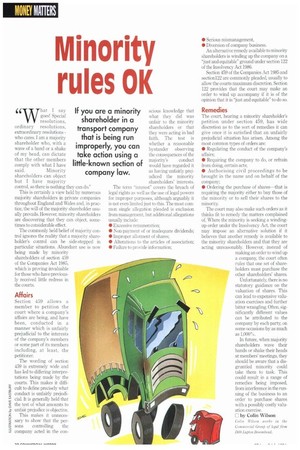Minority rules OK
Page 34

If you've noticed an error in this article please click here to report it so we can fix it.
What I say goes! Special resolutions, ordinary resolutions, extraordinary resolutions who cares. I am a majority shareholder who, with a wave of a hand or a shake of my head, can dictate that the other members comply with what I have
said. Minorit y shareholders can object but I have majority control, so there is nothing they can do."
This is certainly a view held by numerous majority shareholders in private companies throughout England and Wales and, in practice, the will of the majority shareholder usually prevails. However, minority shareholders are discovering that they can object, sometimes to considerable effect.
Section 459 allows a member to petition the court where a company's affairs are being, and have been, conducted in a manner which is unfairly prejudicial to the interests of the company's members or some part of its members including, at least, the petitioner.
The wording of section 459 is extremely wide and has led to differing interpretations being made by the courts. This makes it difficult to define precisely what conduct is unfairly prejudicial. It is generally held that the test of what amounts to unfair prejudice is objective.
This makes it unnecessary to show that the per sons controlling the company acted in the con scious knowledge that what they did was unfair to the minority shareholders or that they were acting in bad faith. The test is whether a reasonable bystander observing the consequences of the majority's conduct would have regarded it as having unfairly prejudiced the minority shareholders' interests.
The term "interest" covers the breach of legal rights as well as the use of legal powers for improper purposes, although arguably it is not even limited just to this. The most common single allegation pleaded is exclusion from management, but additional allegations usually include:
• Excessive remuneration; • Non-payment of or inadequate dividends; • Improper allotment of shares; • Alterations to the articles of association; • Failure to provide information; • Serious mismanagement, • Diversion of company business.
An alternative remedy available to minority shareholders is winding up the company on a "just and equitable" ground under section 122 of the Insolvency Act 1986, Section 459 of the Companies Act 1985 and section122 are commonly pleaded, usually to allow the courts maximum discretion. Section 122 provides that the court may make an order to wind up accompany if it is of the opinion that it is "just and equitable" to do so.
The court, hearing a minority shareholder's petition under section 459, has wide discretion as to the sort of remedies it can give once it is satisfied that an unfairly prejudicial situation has arisen. Among the most common types of orders are: • Regulating the conduct of the company's affairs; • Requiring the company to do, or refrain from doing, certain acts; • Authorising civil proceedings to be brought in the name and on behalf of the company; • Ordering the purchase of shares—that is requiring the majority either to buy those of the minority or to sell their shares to the minority.
The court may also make such orders as it thinks fit to remedy the matters complained of. Where the minority is seeking a windingup order under the Insolvency Act, the court may impose an alternative solution if it believes that another remedy is available to the minority shareholders and that they are acting unreasonably. However, instead of making an order to wind up a company, the court often rules that one set of shareholders must purchase the other shareholders' shares, Unfortunately, there is no statutory guidance on the valuation of shares. This can lead to expensive valuation exercises and further bitter wrangling. Often. significantly different values can be attributed to the company by each parts on some occasions by as much as 1,000%.
In future, when majority shareholders wave their hands or shake their heads at members' meetings, they should be aware that a disgruntled minority could take them to task. This could result in a range of remedies being imposed, from interference in the running of the business to an order to purchase shares with a possibly costly valuation exercise.
El by Colin Wilson Colin Wilson works in the Commercial Group of legal firm Dibb Lupton Broontheact.
















































































































